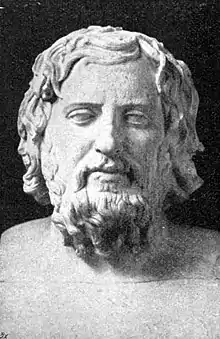Enkrateia
In Ancient Greek philosophy, Enkrateia (Greek ἐγκράτεια, "in power - from ἐν (en, “in”) + κράτος (krátos, “power”) is a state of power over something, usually a state of self-control and self-mastery where one holds power over one's own passions and instincts. It was first used in the context of self-control by three of Socrates' students: Isocrates, Xenophon and Plato. [1] For Xenophon especially, enkrateia is not just a particular virtue but "the foundation of all virtues".[2] For Aristotle, enkrateia is the opposite of akrasia (ἀκρασία from ἀ = without + κράτος = power, control), which is a lack-of control over one's own desires.[3] A person in this state of enkrateia would perform what they know to be a positive choice because of its positive consequences, while a person in a state of akrasia would perform what they know not to be a positive choice, in spite its of its negative consequences, because of the immediate pleasures the choice provides.[4]

Notes
- Jaeger, W. (1943) Paideia: The Ideals of Greek Culture. Volume 2: In Search of the Divine Centre. New York and Oxford: Oxford University Press. pp 52-57
- Jaeger, W. (1943) Paideia: The Ideals of Greek Culture. Volume 2: In Search of the Divine Centre. New York and Oxford: Oxford University Press. p. 54
- "Aristotle's Ethics". The Stanford Encyclopedia of Philosophy. Metaphysics Research Lab, Stanford University. 2018.
- Akrasia in Greek Philosophy: From Socrates to Plotinus (2007) Christopher Bobonich and Pierre Destrée (ed.) Brill. p. 9